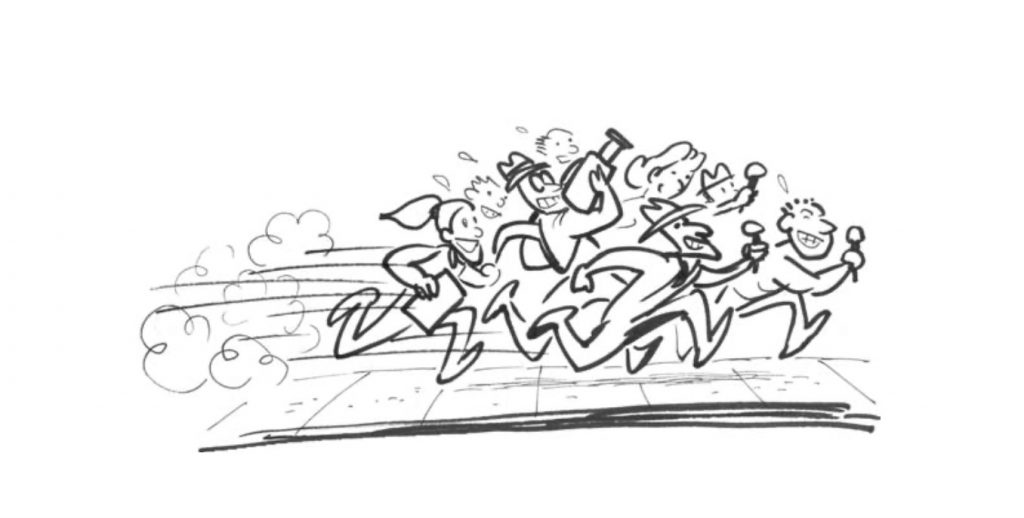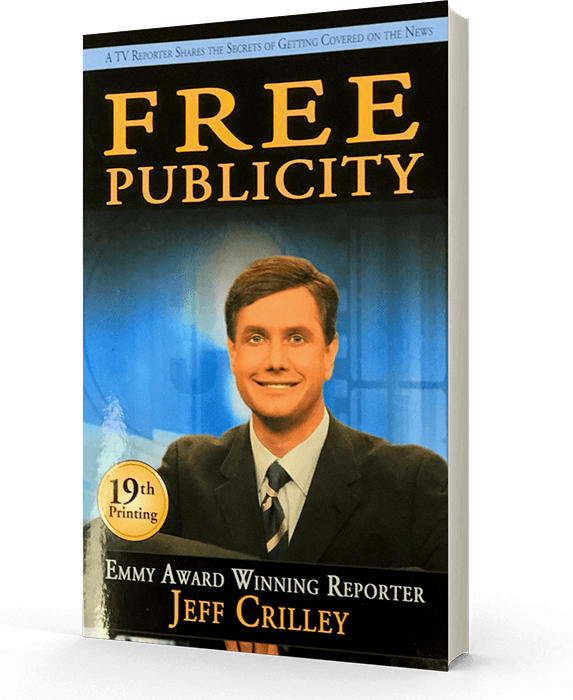KNOW WHEN TO JOIN THE RUSH
Every once in a while, the media will get hold of a big story and you’ll have a feeding frenzy. Sometimes TV and radio stations will devote entire newscasts to one story. Or the newspaper will publish a special section on one event. It seems no other story even matters.
When the media is totally focused on one subject, don’t even waste your time with another story. It won’t make air. Each station is trying to out “team coverage” the other and before you know it, there’s no news time left for anything else. They’ll even cancel sports and weather if a story is big enough.
When I was doing nothing but soft news, people would sometimes call with a great story, and I’d have to tell them to call back when things returned to normal.
If you see these news typhoons coming, you have only two choices. You can wait until it blows over and then pitch your story, or you can take advantage of the media madness.
WHOLE NEW BALL GAME
For example, it doesn’t matter how poorly your team did last year, on opening day every baseball team in the country is World Series-bound. Hope springs eternal, right?
Well, a Dallas disc jockey, Alan Kabel, knew he couldn’t fight the media attention being given to opening day for the Texas Rangers. So, he came up with an angle to complement the coverage, and suddenly it was a whole new ball game.
Alan sent out a news release announcing that in a show of support for the Rangers he and his morning show co-host would be sitting in every seat in the ballpark on the day before opening day. Pure publicity stunt, right? You bet it was. But you know what? It was so timely that no one could pass it up. Alan hit a grand slam. Every TV station in town showed up to cover his stunt.
Alan knew the TV folks would be at the ballpark that day anyway doing a preview of opening day, and all of them would be looking for an angle. It was either get video of Alan going from seat-to-seat in the 50,000 seat ballpark or interview the head grounds keeper on field conditions.
He had the right story at the right time. If he had tried it on opening day, the game itself would have overshadowed his stunt. Two days before—he would have been too early. The day after opening day? Too late. As I said in the first chapter when it comes to news, timing is everything.
GOOD SPORTS
Rarely is the feeding frenzy as intense as it is when your home town team is in the playoffs. I know because it’s been “all hands on deck” in every newsroom I’ve ever worked. News reporters steal what would otherwise be a sports reporter’s story, and soon the entire newscast is spent hyping the big game.
A CHEESY IDEA?
For several years, a Dallas grocery store used this situation to its advantage to get free publicity. In the week leading up to the playoff game between the Philadelphia Eagles and Dallas Cowboys, the store would stage a very effective publicity stunt.
It would send out a press release announcing that on a certain day and time it would remove all the Philadelphia Cream Cheese from the shelves to show solidarity with the Cowboys.
The stunt couldn’t have gone better. When all the cameras had arrived, eager store clerks would begin ripping the containers off the shelves. The store repeated this stunt year after year getting plenty of free publicity until big games between the Cowboys and Eagles became rare.
A ROSE BY ANY OTHER NAME
Like the grocery store, a Dallas restaurant also knew the value of showing support for the home team. The San Francisco Rose was hardly an inviting name for an eatery in Cowboys country when Dallas played the San Francisco 49ers in the playoffs. So in the week leading up to the game, the owner would announce he was temporarily changing the name of the restaurant to “The Dallas Rose.”
When the cameras were ready, employees would lower a “Dallas” banner and cover the part of the sign that read “San Francisco.”
This stunt received several years of repeat coverage until the Cowboys and 49ers stopped having success on the field. And the restaurant owner discovered that a rose by another name could smell very sweet indeed.
A SMASHING EVENT
Another example of cashing in on fan fever comes compliments of morning DJs. What better way for a radio station to get free publicity than to hold a “Green Bay Car Smash” the day before the Cowboys play the Packers in the playoffs?
It’s hardly a new idea. Radio stations have been hosting such events for years. All you need is an old junker of a car, a sledge hammer and some paint to give the car the opposing team’s colors.
The DJs encourage their listeners to come help destroy the car in the parking lot of your team’s stadium.
Of course, most of the damage seems to happen when the local TV crews are going “live.”
GIVING THE JUDGE THE CHAIR
Remember the feeding frenzy that went on during the OJ trial? The media just couldn’t do too many OJ stories. So, when word got out that Judge Lance Ito had switched to a more comfortable chair during the trial—even that became a news item.
The quick-thinking company that sells those chairs didn’t miss a beat. Knowing that the piranhas were circling, Texas-based Relax the Back sent out press releases announcing that they were the ones who gave Ito the chair. Sales rose more than 40 percent during the trial.
A GOOD CANDIDATE FOR PUBLICITY
DJ Rich Michaels says he’s never received more media attention than when he ran for governor. The popular Lansing, Michigan, radio personality wasn’t endorsed by any particular party. In fact, his slogan was “Party all the Time.”
With the media growing tired of serious politics, Rich joked, “I threw my hat into the ring and missed.” His comic candidacy worked wonders. “All the TV stations and papers covered it,” Rich laughed. “It was a publicity stunt and everyone knew it, but they carried the story anyway. It was a nice break from all the boring political stories that were going on.” Rich’s write-in campaign won him 4,000 votes. He was dead last in the election but won the radio ratings race in
Lansing by a wide margin. Rich says that during the week leading up to the election, one out of every two radios in town was tuned to his morning show, an unheard of percentage.
He took advantage of the media’s election fever to create his own remedy for publicity. But he didn’t have to be a radio personality to win such coverage. Anyone could have come up with a joke campaign to give the media a refreshingly funny alternative to covering the real races.
There are all sorts of ways to turn elections into oddball opportunities for PR. I’ve covered Elvis impersonators running for office, write-in campaigns for dogs, even people running campaigns for fictional characters, such as Archie Bunker and Donald Duck. They always lose, but in terms of media attention, they win by a landslide.
PULPIT PUBLICITY
Churches can take advantage of the feeding frenzy too. And as any reporter will tell you, Sundays are notoriously slow. But members of the clergy don’t need divine inspiration to benefit from such a situation. It’s just a matter of pitching the media a good story on a bad day for news.
Let’s say there was a huge tragedy during the week. It doesn’t matter whether it’s local or national. If the media is focused on one story, you have an opportunity to showcase your church.
Take September 11, for instance. It was such a monumental tragedy that millions depended on their faith to get through. In the days following the attack, churches everywhere invited the media to their services to get video of worshipers gathered together in prayer.
Other churches have done the same thing after big fires, natural disasters, or horrible crimes—events that cause people to turn to places of worship for support.
But it doesn’t take a tragedy to get the media to find religion. My father, Dr. Robert H. Crilley, was a minister in downtown Detroit. As a boy, I remember him being a master of the media.
Each year he received amazing TV and newspaper coverage for his Easter Sunday balloon launch. As a symbol of the resurrection, the congregation at Fort Street Church would let go of their balloons as my father cheered, “He is risen.”
It was a great photo opportunity. That evening on the news and the next morning on the front page of the paper, there was my father with his arms in the air and hundreds of balloons floating past the steeple.
JUST WHAT THE DOCTOR ORDERED
Smart physicians can do the same thing. When Theresa Merola-Hernandez worked in PR at Southwestern Medical Center in Dallas, she was brilliant at getting media attention for her doc-tors, often getting them national attention.
Anytime a high-profile illness was in the news, she was on the phone with the reporters letting them know that she had a doctor who could talk about it.
If the president had a hernia, she had an expert. If a famous athlete or coach died of a disease, she had a doctor who could explain it. Even if it was just lotto fever, she had a psychologist lined up who could talk about gambling.
All hospitals have experts, but her doctors seemed to be the ones who were always in the news simply because she performed a check-up on her physicians and wrote them a prescription for free publicity.
A MEAL OF TITANIC PROPORTIONS
In 1998 the Fairmont Hotel in Dallas decided to plunge into the feeding frenzy surrounding the movie Titanic. On the anniversary of the ships sinking, the hotel threw a “Last Dinner on the Titanic” party to increase traffic to the hotel’s restaurant.
“We tried to duplicate everything right down to the last detail,” said PR genius Gail Cooksey. “From the nine-course meal to the staff dressed in period costumes, everything was exactly like it was on the ship just before it sank. And the media ate it up!”
Boy, did we ever. The event received coverage on every TV station in town as well as front-page articles and photos in both The Dallas Morning News and Fort Worth Star-Telegram.
And the public’s enthusiasm for the event was unsinkable. Because so many people wanted to experience it, the “last meal” was quickly expanded from one night to a week-long series of dining events.
DON’T WAIT FOR A STORM TO BUY AN UMBRELLA
Start training yourself to anticipate these news typhoons. It’s really pretty easy when you know what to look for. Start planning your holiday stories months in advance. Don’t wait until Christmas to get your charity idea underway. If your team is on track to make the playoffs, start thinking about how to ride that train. And never wait until a movie is setting box office records to plan a tie-in. The blockbusters usually create a buzz long before they are in the theaters. The folks who really master the media are the ones who are always shopping for the right umbrella for the next storm.
NEWS YOU CAN USE
- A feeding frenzy is your best opportunity to get coverage.
- Sell what the news is buying. During a frenzy the news media is on a buying binge.
- Anticipate these news typhoons, and prepare to ride the wave. Is there a hot event coming up? A concert? A sporting event? A hot movie? Plan a tie-in.

